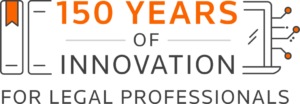Thomson Reuters Celebrates 150 Years: Andy Martens on the Criticality of Editorial Work

Thomson Reuters is commemorating 150 years of customer partnership and innovation to honor the 1872 founding of John B. West Publisher and Book Seller. West’s innovative spirit lives on in Westlaw – a product that still carries his name – and in the AI-driven products and legal research technology tools used by legal professionals worldwide.
Our Legal Current series features voices across Thomson Reuters sharing how West’s legacy of customer partnership and innovation endures today. We hear today from Andy Martens, head of Research Products, who has worked at Thomson Reuters for nearly 30 years.
“Legal research is still super hard”
As one of the masterminds of the Westlaw Precision launch, Martens knows about the value of combining powerful technology with a human touch.
To help develop Westlaw Precision, Thomson Reuters added 250 new attorney editors – its largest-ever investment in editorial operations – to mark up and classify case law in more useful ways, including by issue outcome, fact pattern, motion type, motion outcome, cause of action, and party type.
“Efficiency and accuracy are supremely important, but the only way to enable those effectively are to use humans as part of the process,” Martens explained.
He added: “The need to be 100% accurate has never relaxed. There’s been a huge amount of talk in the last five years or so about artificial intelligence, but what is often ignored is what it takes to bring AI performance up to the level required for legal work; even with state-of-the art AI and machine learning, what’s required today is to combine that technology with the legal expertise of humans.”
Martens noted this approach draws on the company’s history of innovation and customer partnership.
“Where we are today is continuing to build on the advantages that we’ve had over the last 150 years,” Martens said. “The same insights that John B. West had about summarizing, annotating, and organizing the law and making it easier to find remain true today. The core ingredients to a highly successful legal product remain the same.”
He saw how John B. West’s legacy played out in developing Westlaw Precision.
“The importance of working with our customers to understand what problems remain difficult is more important now than it’s ever been,” Martens said. “There’s almost an infinite number of problems that could be solved. Our teams focus on identifying where our customers are feeling the most pain and continuing to focus and refocusing on those areas.”
He said he’s proud of the Thomson Reuters contributions to making legal research more efficient and more certain.
“And yet, when we talk to customers, we see that legal research is still super hard,” he said. “That’s why we invested what we did to build Westlaw Precision and to continue enhancing our editorial processes. There’s a huge amount of work yet to be done to make those problems less acute for our clients.”
He added: “It actually blows my mind how hard it still is to do research and how hard it is to solve the problems inherent in research. We thought we would be able to do much more of it with machine learning than we were actually able to do. The editorial modifications we’ve made will allow us to layer a whole new level of value on top of what we’ve done with Westlaw Precision, continuing to differentiate us in the market.”
“E-mail was barely a thing”
 “When I started at West Publishing [now Thomson Reuters] 30 years ago, the Internet wasn’t really a thing,” Martens recalled. “E-mail was barely a thing.”
“When I started at West Publishing [now Thomson Reuters] 30 years ago, the Internet wasn’t really a thing,” Martens recalled. “E-mail was barely a thing.”
He said the pace of change today is “dramatically different.”
“Looking at some of the capabilities around machine learning, the cycle time is reducing wildly,” Martens said. “Part of it is open-source technologies, and part of it is advances in the underlying technologies. And a big part of it is the competition. It’s not OK to do a big thing every five or 10 years; we need to be doing big things all the time.”
This means continuing to invest in the development paths his teams began with Westlaw Precision.
“We’re starting to demystify some of the law by marking up attributes that are critical, like material facts and procedural posture, in such a way to make it easier for legal researchers to get the answers they need so that they can focus their efforts on the areas where they can provide unique value as well,” Martens said. “We want to make access to the law as easy as possible.”
“We’ll be adding Westlaw Precision capabilities into Quick Check to make brief review and brief creation significantly easier,” Martens said. “There’s going to be another layer of development on top of Westlaw Precision as our practice-area builds mature. I don’t know the specifics of what they will be yet; we need to spend a bunch of time with our customers again and see what problems they want us to solve.”
“Criticality of editorial work”
“The thing that I’m happiest about is how the organization and the market recognizes the criticality of editorial work; that it’s not just technology, and it’s not just software,” he said. “It requires a combination of humans and technology to really solve dramatic problems.”
He said what’s surprised him most during his tenure is the continuing importance of legal research and legal information.
“We’ve gone through cycles where Thomson Reuters has said, ‘We’re not an information company, we’re a technology company.’ And every time we go through that cycle, we see again that those things aren’t that compelling unless they’re information-enabled; so, that’s been the biggest learning.”
He added: “It comes back around to the fact that it’s the human insight that makes us unique, regardless of where we deploy that insight. Without it, we are a legal information provider, like so many others, and with it, we’re unique.”
Read more perspectives on the Thomson Reuters legacy and read additional profiles here.